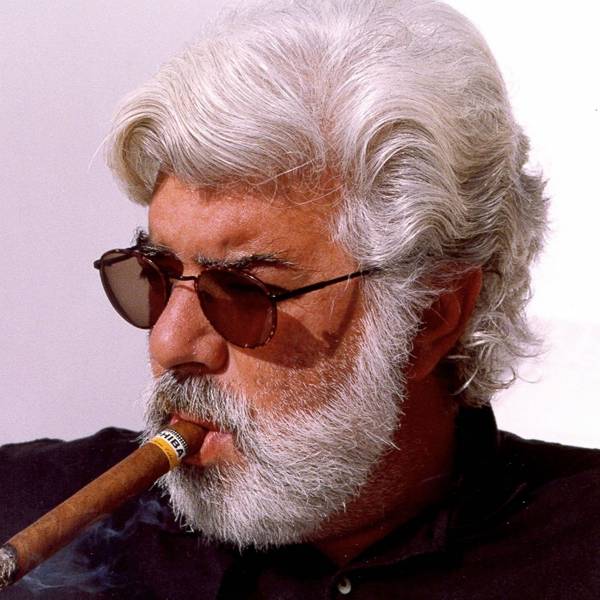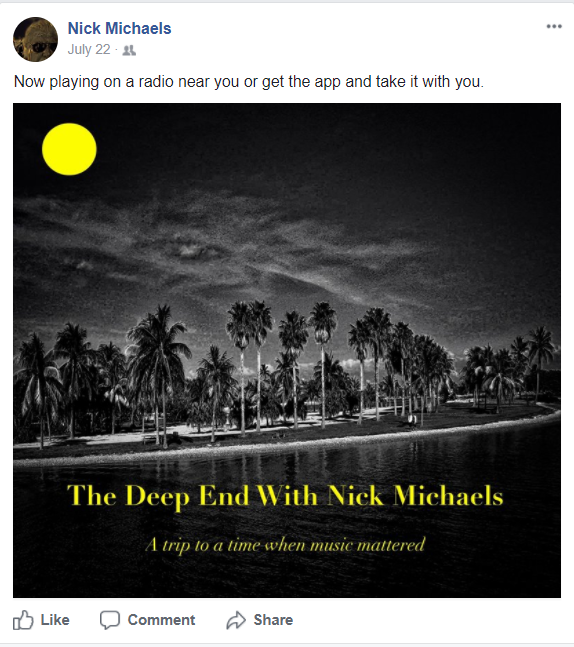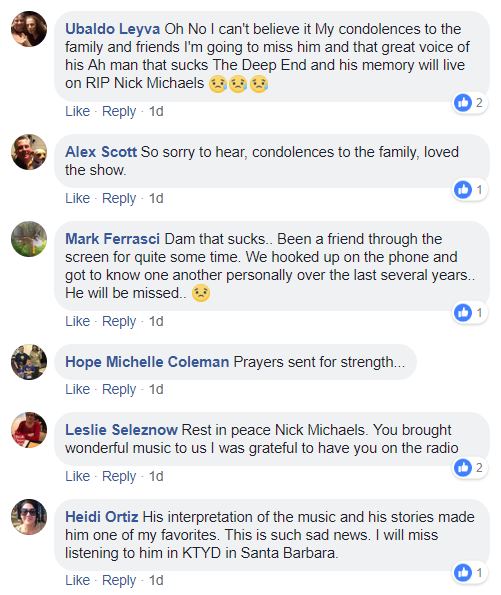
Tempus fugit, as they say. I don’t know about you, but the older I get, the faster time seems to fly. These days for me it feels like its a Mach 2.
That reality slammed home for me when I was scrolling blog posts from this month back in 2018 to find just the right #TBT post for today. I ran into this one, my tribute to Nick Michaels. And I’m having trouble getting my head around the fact it’s been five years since he passed.
I started thinking how Nick would look at the world today. Or how he would have reacted to COVID and all of its fallout. With many of the events that have occurred since he left us, it’s not hard to imagine his reaction.
He’d be pissed we’re still mired in much of the same things we were when he last lit up one of his trademark cigars. And he wouldn’t be surprised that the great rock music he told stories about continues to endure.
As for A.I., Nick would be apoplectic. I remember him talking about that lame DJ, Al Gorithm. So I can only imagine what his reaction would have been to ChatGPT and robots doing airshifts. But to those now living in fear they may lose their livelihoods, Nick may very well have advised you to be so damn good on the air, you couldn’t possibly be replaced by a bot. That’s how we approached his voice art and audio magic. He wasn’t just another voice – he was better than that. Nick didn’t sound like everybody or anybody else. He was unique, a unicorn among us who railed at the bullshit around us.
I miss those rants. They were always a sign of his deep passion for his art, his music, and for radio. And they kept the rest of us honest.
He wanted us to be better. – FJ
This past weekend, radio lost one of its most unique voices – and its most powerful storyteller. Nick Michaels passed away suddenly in his home in Miami. And for those of us who knew Nick and his bigger-than-life influence on rock radio, the news sent shock waves throughout social media circles.
Nick was a one of a kind radio guy. He told us we were living in “an over-communicated world” long before we figured it out for ourselves. He was the king of capturing attention – standing out by not shouting. In fact, Nick’s whisper connected with more people than all those screaming, pukey dime-a-dozen voice guys.
Nick was the poet laureate of radio. He was spinning fascinating stories about the music before there was “This American Life” or “The Moth Radio Hour.”
My relationship with Nick started without ever meeting him. I somehow managed to avoid his outsized presence for a couple of decades. Then in early 2002, Entercom brought me into consult a struggling Triple A station – KQMT in Denver. The Mountain was hopelessly behind market icon KBCO in the ratings, and was mostly an afterthought in the market.
Dan Michaels was brought into program the station, and immediately knew he had to somehow set it apart. Clear Channel (as it was known back then) owned every rock station in the market. And so one of Dan’s first moves was to bring in Nick Michaels as the station voice. But as I quickly learned, he was much more than that. He had an opinion – in fact, he had lots of them. And at times, he was critical of our programming, our positioning, and our writing.
I was in the market one day, and found myself complaining to Dan that some of our positioning language wasn’t on the air. And he flat-out told me that Nick wouldn’t read some of our copy. It turned out they had a production call scheduled that day, and I told him I wanted to sit in. Dan warned me – “If he knows you’re in the room, it’s not going to go well. He’s not fond of consultants.” So, I told him not to introduce me, and I quietly hung back and listened to the exchange.
And it was strangely mesmerizing hearing Nick belittling Dan’s (and my) copy, explaining to us we were missing the essence and passion of the music by simply tacking on slogans to the production we were running. It was an eye-opener, and I saw how Dan had to cajole, nudge, placate, and even beg Nick to even come close to getting what he wanted.
But the fact was, Nick’s stuff was great. It was much better than ours. And it reached out and grabbed the audience, reconnecting them with the music they grew up with. Nick could spin amazing stories about the music and the fascinating people who made it, all the while reminding you why you fell in love with it in the first place.
In fact, much of his copy did just that. It took you back to the dorm room, your basement, your first girlfriend or boyfriend – and brought you back in touch with why the music first moved you, and why you became a rock fan.

Years later, Greg Solk introduced me to Nick, and we shared several meals and meetings together. And we took to each other, despite our very different roles in helping our stations win. Nick didn’t just voice The Drive in Chicago. He was its soul. Greg Solk developed the concept and execution for a station that is a winner to this day. But it was Nick’s copy, his treatment, his passion, and his love for the music that made the station sing. A lot of people have come and gone over the years at WDRV, but Nick remains the voice – and soul – of the station. Production director Matt Bisbee and Nick have brilliantly collaborated to make the magic in the production studio, making The Drive sound different than any FM station on the dial.
Nick was a renaissance man. Originally from Canada, he broke into national advertising in New York City before he turned 30. And that signature voice – you could always differentiate a spot with Nick’s touch – it just stood out and grabbed you. The guy was an artist (one of his photos above), a master gardener, an amazing family man, and one of those rare people with a naturally great sense of style.
He loved life, while pointing out its contradictions and its parodoxes. And he brought us closer to the beauty and splendor of the world around us, whether it was music, trees, art, people – or radio.
For nearly four decades, he lived the stylish life in Miami, and he loved that Florida vibe. After I started making my visits to the southeast corner of the state a few years ago, Nick and I and our wives got together from time to time.
Our meals started with conversations that turned into soliloquies, harangues, rants, and even lectures. Nick’s conception of rock radio was a far cry from what it’s evolved into today. I learned something from him every time we chatted. He re-centered me, reminding me why I started this career in the first place, but he was also very critical, asking why wasn’t today’s radio better. Whether we talked about corporate radio or Donald Trump, you knew where Nick stood – on everything.
I sometimes felt guilty, too. Because he was usually right. Sometimes when I’m involved in a Classic Rock music sort, I think of Nick, and I thank God he wasn’t in the room watching us slice and dice music like commodities. It isn’t difficult to still hear his voice telling us all how you can’t use spreadsheets and algorithms to select music for millions of fans all over the country.
Many of the PDs who worked with Nick over the years developed that built-in “WWNS mechanism” – asking themselves What Would Nick Say when faced with a key decision or aesthetic dilemma.
Nick was so right that I sometimes didn’t want to hear it. While I am intensely proud of the work I’ve done in radio these many years, Nick was a constant reminder to me – and everyone who worked with him – that we should be doing better. That we should up our games and set higher standards. That we should better reflect our audience and the music that shaped the times and their lives. He ended up starting his own syndicated show, “The Deep End,” so he could produce it his way – and show us all how it was done.
And it was all about his listeners. His show’s Facebook page showed up on my feed last night, and while several of the comments are from radio people, most appear to be Nick’s audience members – his loyal followers – expressing their shock over the news and their love for what he brought into their lives:

Crazy thing. I was lucky to attend my first Greta Van Fleet concert this past weekend in downtown Detroit, ironically on the day he passed away. If you haven’t heard of this band, they’re a remarkable story – a foursome of Gen Z kids from nearby Frankenmuth, Michigan who brilliantly make music reminiscent of the seminal rock and blues many of us Boomers grew up with.
As I watched these kids play, enjoying their passion and musicianship, it took me back to some of the early rock shows I’d had the honor of seeing decades ago. And during one great jam, Nick’s voice came into my head, and I remember thinking he would really like this band.
But he’ll not have that pleasure now.
Condolences to Nick’s family, friends, clients, and listeners at this very difficult time. And also to the rock radio community and all the people who Nick touched, influenced, yelled at, and taught valuable lessons about radio, music, rock n’ roll, life, and why the hell we’re doing this in the first place.
Nick Michaels set a high bar, but helped us attain success, connecting us with what motivated our careers, often propelled by our love for the music.
Here’s one of my favorite Nick vignettes:
His is an irreplaceable voice on the airwaves.
Rock on, Nick.
For another side of Nick, check out Holland Cooke’s tribute here.
- Under The Influence(rs) - March 14, 2025
- Radio’s Dilemma: Trump Or Get Trumped - March 13, 2025
- What About Bob? - March 12, 2025





I had been in the “business” for about 25 years when I got to sit in on a session with Nick. Up to that point I thought I’d heard everything and new everything. Bless his heart, he had a way of proving me (and every other “expert”) wrong. He could definitely make you pause, regardless of your format. (We were a news-talker). Nick was a master at his craft, and had no qualms about letting you know that. He could be a master at yours too. He had a way of opening my eyes..and it makes me sad that his are closed forever.
A friend tried to prepare me for my first Nick session. It wasn’t enough. At first, I couldn’t believe what I was hearing. Nick said something like, “You don’t know shit about Jethro Tull” and we were off to the races. Thanks for the comment.
Whenever Nick called – I knew that I had at the very minimum, at least an hour long, animated phone conversation ahead of me. I was a fan, and a student. I can only imagine the quality of the rant he would have come up with on the topic of AI. Your are missed Nick, but your work and legacy continues to inspire.
Howard, exactly. An hour easy, and I knew I was due for a much-needed dressing down. I miss him (and I miss them).